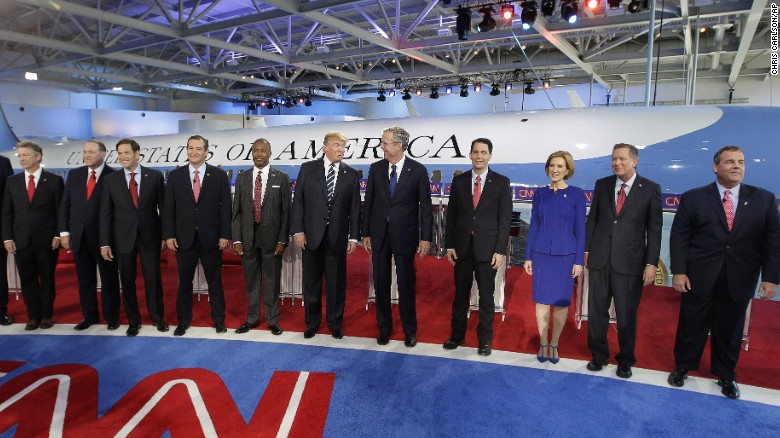
As Republican candidates line up in anticipation of their next televised de- bate, scheduled for Feb. 26th in Houston, the nation’s TV networks and GOP leaders reached a landmark agreement this week when they settled
on guidelines featuring Ten Commandments of Debate that provide for maximum network profits and mutual pandering to the U.S. voting public.
RIGID RULES TO BE APPLIED;
CANDIDATES PROTECTED;
MODERATORS NO LONGER
TO ASK TOUGH QUESTIONS
Two-hour Trump-induced limit
expanded to 300 minutes;
10 “Commandments” set tone
NETWORK ACCEPTANCE OF GOP
ULTIMATUMS ON GUIDELINES
ENDS CANCELLATION THREAT
By David Maril
Stop the presses!
Word has just arrived the Republican party, after days of continuous negotiation, has reached agreement with NBC and other television networks scheduled to televise the GOP presidential debates.
Party officials had threatened to pull the plug on the next scheduled debate, slated for Feb. 26th on NBC.
Many of the GOP candidates were outraged at the negative tone and toughness of questions they were forced to address live on camera at the recent CNBC telecast.
Instead of focusing on economic issues, the financial network, owned by NBC, had ambushed the candidates with some questions perceived as hostile, focusing more on the character of the presidential hopefuls instead of their campaign rhetoric.
To reach agreement with the networks, the GOP candidates did have to make some concessions.
One — and the toughest roadblock — was to reverse their demand for shortening the telecast to two hours. Instead, the GOP agreed to five-hour broadcasts. This will allow the networks to cash in on a lot more advertisements and commercial revenue.
The other big concession for the GOP candidates was the commitment to make several minutes of promotional film-clips advertising the debate that the network can air in advance to boost the prospect of jumbo ratings.
Despite giving in on these two areas, the GOP feels it has achieved a 10-point agreement it needed to guarantee what it calls fair and balanced coverage that protects the candidates against the negativity of the liberal mainstream media.
THE TEN COMMANDMENTS OF DEBATE
1) The debate stage will include all of the candidates, including the ones polling just 1 percent who had been banished to the “kids” podium in non-prime time. Lindsey Graham, George Pataki, Rick Santorum and Bobby Jindal are guaranteed a spot on the main stage as long as they are breaking the 0.000000002 percentage mark in polling.
2) The 14 or 15 participating candidates will be allowed 10-minute opening statements each; and then, at the conclusion, 15-minute closings.
3) The networks agree to expand the number of moderators to at least one per candidate. Each presidential hopeful will be allowed to select his or her own personal moderator and approve the questions in advance. If a candidate prefers, the questions will be asked by a campaign associate or personal friend.
4) The networks agree that the debate participants will not be allowed to say anything negative about any of the other Republican candidates. The only attacks permitted will be criticism of anyone connected to the Democratic party.
5) The networks also agree to produce a minute-long tribute, highlighting the candidate’s accomplishments, before each begins his or her opening statement.
6) No follow-up questions will be allowed. This guarantees the broadcast will stick to its well- choreographed schedule.
7) Debate moderators are not allowed to interrupt candidates, even if they run past their time limits.
NETWORK TO PROVIDE CONTRIBUTION INFO TO VIEWERS
8) Whenever each candidate is speaking, the network will flash up information on how to make campaign contributions.
9) The debate broadcast will be taped earlier in the day, allowing candidates the right to edit their on-camera appearances.
10) The network agrees to a four-day ban, following the conclusion of the debate, on negative comments about the presidential candidates by any of its commentators, newscasters or employees.
For example, the following will be off-limits for 96 hours:
No mention of Jeb Bush’s shrinking poll numbers, loss of major campaign donors or expanded whining as he takes up the mantle of political victim being prevented from assuming his entitled residency in the White House.
No mention of Marco Rubio’s lack of governing experience, his flip-flopping on expanding the pathway to legal immigration or his inability to manage his own finances.
No mention of the inconsistencies and inaccuracies of Ben Carson’s statements on international affairs and domestic issues.
No mention of Donald Trump’s bombastic, irresponsible and misleading policy statements or his lack of specifics on how to achieve his goals.
No mention of Carly Fiorina’s missteps as CEO of Hewlett-Packard.
CHRIS CHRISTIE PERFECTS HIS ONE-LINERS
No mention of how dysfunctional New Jersey is becoming while its Governor, Chris Christie, perfects his sound-bite one-liners.
No mention of how Ted Cruz thrives on getting his name in the headlines, pushing his right-wing views but has proven incapable of getting legislation passed.
All these GOP presidential hopefuls are in agreement. They believe with this new, highly structured format, candidates will have a chance to introduce themselves to the public the way they believe they should be known.
By agreeing to these guidelines, the cooperating networks are affirming that it’s unrealistic in the Republican presidential debates for the public to expect journalism to intrude on political shilling and promotion.
—————————— ——————————
OK, you figured out quite a while ago there is not any TV debate deal and this is more a prediction or warning of what might happen.
But is it that farfetched?
The way things are going, where candidates are allowed to get away with giving talking-point statements, instead of answering debate questions, this absurd acquiescence is possible.
Unfortunately, the TV networks, obsessed with profits and ratings, are pandering to politicians and not letting the journalists do their job.
davidmaril@voiceofbaltimore.org
“Inside Pitch” is a weekly opinion column written for Voice of Baltimore by David Maril.
CHECK OUT LAST WEEK’S “INSIDE PITCH” COLUMN: click here
…and read archived Dave Maril columns by clicking here.





